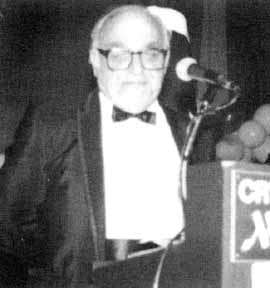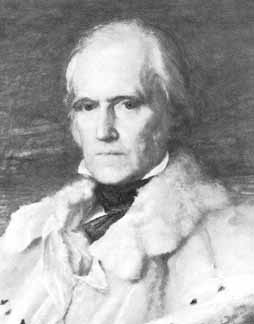|
|
Since
the relentless barrage of anti-Turkish propaganda in the West results in few
non-Turks desiring to have much sympathy for Turkey and the Turks, those few
who break this pattern deserve special consideration.
Of course, there are
more friends of Turks than the ones listed here. This page will list those
I'll be coming across arbitrarily... I haven't made it an order of business to
make this a comprehensive listing.
|
|
|
| DR. LEON PICON |
Leon Picon Receives Distinguished Service Award
(As reported in ATA-USA, Fall 1986)
by Leylã Kazaz
Each year, the Assembly of Turkish American Associations bestows its prestigious
Distinguished Service Award on an individual who has made outstanding contributions to
furthering the goals of the Turkish-American community. The Executive Committee faced no
difficulty whatsoever this year in selecting the recipient of the 1986 Distinguished
Service Award, Dr. Leon Picon. One of the founding members of the Assembly, a former
Secretary-General, and currently serving as a consultant and advisor to the ATAA
President, Dr. Picon is well-known not only in Washington but across the nation for his
outstanding abilities and his contributions to furthering the goals of the
Turkish-American community.
Those who do not know him well often express a sense of pleased wonder that an individual
who is not a Turk, or married to one, should be so deeply committed to the
Turkish-American cause. Dr. Picon is a retired diplomat who served in London, Tokyo, and
Ankara. It was as the American Cultural Attache in Ankara that his fiery attachment for
Turkish affairs was kindled.
 |
|
Born in
1917, Dr. Picon may no longer be with us.
|
Best known among Turkish-Americans for his brilliantly written and
insightful articles in ATA-USA, the importance of his role in the formation of the
Assembly is somewhat hess well known. However, it is as one whose many contributions to
the organizational growth and development of the Assembly that he is perhaps most valued
by the Assembly leadership. His sage advise and counsel has been of invaluable assistance
to the presidents and boards of directors of ATAA over the years since the organization’s
inception. Also of inestimable value has been Dr. Picon’s long years of contribution to
ATAA’s Council on Education, as well as his voluminous correspondence on behalf of the
Assembly with Members of Congress, Administration officials, the media, and those
concerned with U.S.-Turkish affairs. On numerous occasions, he has lectured on the Jews of
Turkey and successfully challenged the distortions of history by certain anti-Turkish
groups.
As his life story so vividly depicts, Dr. Picon is an individual of many dimensions and
talents. Born in Reading, Pennsylvania in 1917, he received his A.B. from Brooklyn College
in 1938, and his Ph.D. from the Dropsie College for Hebrew and Cognate Learning in 1941.
His doctoral dissertation dealt with Egyptian hieroglyphics. Years later, when the
Tutankhamen exhibit came to Washington, he escorted private tours for his friends through
the exhibit. He is also an authority known for his translations of Japanese literature and
his articles in Japanese intellectual journals, one of which was included in a book called
“The Ten Most Important Essays of the Decade.” In his home is a case which contains a
Key to the City of Tokyo, which is awarded seldom and never lightly. It was given to him
for his major contributions to bi-national cultural relations.
He and his beloved wife Lucy have been tournament bridge players, yet he recently wrote
the definitive essay on “How to Avoid Playing Bridge,” a delightfully witty piece full
of outrageously funny suggestions for “sure-fired” ways to avoid the dread entrapment
of playing bridge. Both husband and wife are also well known in another field that has
nothing to do with Turkey—they are both committed to Ham Radio. Those who regularly
attend the Assembly’s convention banquets, or who have traveled together with him in the
Washington contingent to ATAA conventions in other cities, have seen Dr. Picon happily
engaged in yet another favorite hobby: sculpturing balloon animals for entralled children
(of all ages) or mystifying audiences with his card handling. He has held every office in
the Society of American Magicians, Washington Assembly, and is a Past President. Dr. Picon
was also once a teacher of the blind, and during his collegiate days established the first
college textbook library for the blind.
The list of Dr, Picon’s accomplishments goes on and on, demonstrating that he is clearly
a uniquely talented individual. But it should not be overlooked that he is also a most
loving husband of 42 years, the father of three, and a grandfather many times over, His
love for his family is openly displayed in the many photographs placed around his home and
in the pride with which he points them out to his guests. Upon being presented with the
Assembly’s award, he first thanked everyone for the honor with his characteristic
applomb. He then turned in the direction where Lucy Picon was seated and proceeded to
publicly thank her for her years of love and support of his activities and to express his
own admiration and love for her. Clearly, they are both very special people.
Dr. Ülkü Ülgür, Past President of ATAA, presented the 1986 Distinguished Service Award
to Dr. Picon with these words:
“We Turkish-Americans hold him in the highest regard and want to show him our
appreciation for his hard work and dedication to our common cause. We can never repay him,
but on this occasion we can tell him that we appreciate everything he has done, and honor
him for the many contributions he has made for Turkish-Americans, Turks, and Turkey.”
|
SIR STRATFORD CANNING
|
Holdwater: I didn't do my research on
Stratford Canning, and I should know better than to take the word of the
sensationalistic book where the following is from... "The Sultans" (USA,
1973) by Noel Barber, a writer who would be close to the hearts of Greeks and
Armenians, regarding the bias that looms in his work. However, my senses told me
these passages are probably not too exaggerated, so for the time being, I wanted to
pay tribute to a man who apparently was a real friend of the Turks. (What is
described are some steps leading to the Crimean War in the early 1850s... which
fellow Englishman Eversley blamed on one man: Stratford Canning.)
 |
|
Sir
Stratford Canning
|
It was now that Stratford Canning, the
life-long friend of Turkey, returned to the scene. After being ambassador to
Constantinople, Canning had retired to England only a year previously, where he had
been rewarded with a peerage. Now Britain sent him back — as Lord Stratford de
Redcliffe — and as the threat of war loomed he was told to use Britain’s
influence to neutralise the alarming position that was developing; for the danger
was that Nicholas had now gone too far to withdraw — if he wanted to withdraw.
Stratford was a curious man. An old
Etonian, he had spent most of his working life in Turkey and he had exercised
enormous influence over Abdul Mejid. Eversley, who regarded him as the most
distinguished diplomat ever employed by the British Government, also felt that he
was one of those men who ‘took much responsibility upon themselves, and dictated
rather than followed the policy of their Governments.’ He was tall, dignified and
impeccably honest. The Turks trusted him implicitly, and they were highly impressed
with his steadfast refusal to deal with any Turkish statesman ‘whose hands were
known to be stained with blood.’ He loved Turkey; and he loved England. His two
missions in life were simple: to compel Turkey to reform, and to serve his country.
Tragically, in both of these he failed; perhaps because of a third obsession: that
he felt it his duty, as Eversley put it, ‘to oppose the schemes of Russia at every
turn.’ It was a bigoted hatred, stemming from a snub when the Czar Nicholas
refused in 1833 to receive him as ambassador to his court. His bigotry had not much
mattered in the past, though it had embarrassed his government more than once, but
at least Stratford had given Britain a powerful voice in the Turkish court. The
Turks worshipped him, christening him ‘The Great Elchis,’ the Great Ambassador.
As the threat of war grew nearer, it
became clear that the sanctimonious Russian excuses of ‘saving the Christians’
masked the Czar’s main reason for going to war. This might be a ‘Holy War’ in
the censored Russian newspapers but it was, in fact, a war for Constantinople, and
Britain could not afford to let the Ottoman capital fall into Russian hands, since
this would cut her lifeline to India. The political reasons in England were
disguised too. A generation had passed since the Napoleonic wars, and a war spirit
was aroused in which the hatred of the French had been replaced —in the minds of
the adventurous who knew nothing of war — by a fear of the Russian Czar.
Austria and France were equally afraid
of Russia. France saw a danger of her superiority in the Mediterranean vanishing if
the Russians took Constantinople. Austria feared a land attack if the Russians
became all-powerful. Therefore, Europe made one last desperate bid for peace. All
the European powers except Russia met in Vienna and produced a formula for settling
the religious differences between Russia and Turkey. It was reasonable, and gave
Nicholas a chance to back down without losing face. Delightedly, he agreed to the
terms. The European powers commended the agreement to the Turks, and Britain
instructed its ambassador ‘to use all his efforts to obtain its consent’.
Stratford’s influence over the Sultan was so powerful that Britain knew he could
persuade Abdul Mejid to agree. But could Stratford be trusted? Lord Aberdeen, the
British Prime Minister, had such doubts that he sent a note to the Foreign Ministry
warning that ‘I have prepared the Queen for the possibility of Stratford’s
resignation.’ Lord Clarendon, by then Foreign Minister, complained bluntly that
‘it is a misfortune that the government cannot feel sure of Stratford acting with
us for a peaceful solution.’ But there was an insuperable problem to recalling
him. ‘We have no one fit to take his place.’
Their worst fears were soon confirmed.
Stratford, with his almost paranoiac hatred of Russia and his belief that the Turks
were being humiliated, was unable to face up to his duty. Officially, he performed
his task of asking the Turks to agree; but the Turks knew their man, and the very
manner in which he spoke the words left no doubt in their minds that he disagreed
with his government. Flatly the Turks rejected the Vienna proposals, and so, as
Eversley summed up, ‘He was undoubtedly the main cause of the war which soon
ensued between Great Britain and Russia.’
To the rapturous Turks Stratford was
still the Great Elchis, for though he was largely responsible for the deaths of
thousands of his fellow countrymen he pushed the Turks into a war in which they
played only a minor role but which, thanks to Britain and France, gave the tottering
Empire a respite of twenty years.
|
| |
|
|